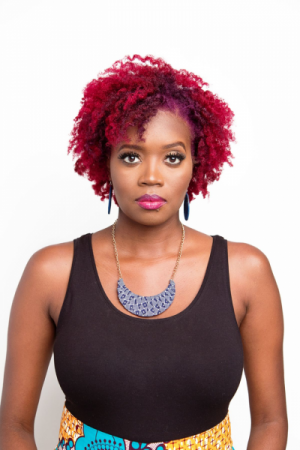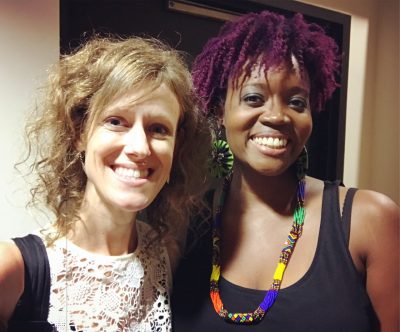
Editor’s Note: This is a guest post written by my friend and former editor Kelly Carr. Enjoy 🙂
At the age of 17, Amena Brown made her way into the world of spoken word a little unwillingly. Previously in adolescence, Amena had performed poetry by Maya Angelou and others, but she had never let the world hear her own writing. During her senior year of high school, her mom discovered Amena’s journal full of poetry and submitted a piece for competition without Amena knowing. When Amena won and was required to perform the poem live, she nervously stepped onto the stage—and ended up falling in love with the experience of sharing her own work.
Fast forward 20 years later. As Amena’s journey of writing has continued, she has moved into a season of storytelling, part of which resulted in her new book, How To Fix A Broken Record: Thoughts on Vinyl Records, Awkward Relationships, and Learning to Be Myself, that releases November 7. She described it on a recent podcast as “the most myself I have been in my work.”
I had a chance to sit down and chat with Amena a few weeks ago at the Catalyst Atlanta conference and converse with her about truth in art, the broken records our country needs to address, and friends you can snot in front of!
 Spoken word was a voice for you beginning at age 17. How do you see spoken word influencing young people today?
Spoken word was a voice for you beginning at age 17. How do you see spoken word influencing young people today?
Amena: “Spoken word and slam—as long as they’ve been around—have always been an underground experience. There was always a community of people enjoying it. It’s just now coming more to the mainstream. In a way that’s nice. When I was first started to do poetry at 17 in San Antonio, Texas, there was no slam team there, there was no poetry scene, no place to go and do an open mic or things like that. Now as a young person you see poets making a living doing poetry, you see all the outlets for that—that was definitely not a thing when I was young, 20 years ago.
“I think that’s the beautiful thing about poetry—it’s very generational. You’re hoping what you’re doing is influencing the poets who come after you. You want to speak well to them, encourage them to keep writing, find their voice in the midst of it. I think that’s a beautiful thing.”
Is there a drawback to these art forms becoming more mainstream?
Amena: “In faith-based environments, there was a time when you would write spoken word scripts. You would write a piece, just like how we do with worship songs, and people would sing a worship song, and they might do your poem too. I stopped doing that because part of where it goes wrong is when the poetry doesn’t stay true to the culture. . . . it gets wayward a bit when people want the results of spoken word without being true to the culture it comes from. Maybe instead of someone reading a poem I’ve written, write your own or find a poet where you live and give them the opportunity.”
“It’s a beautiful thing, returning the beauty of art to our worship services. In some ways we started to demonize art, particularly in our western churches. We left art ‘out in the world,’ as if theology and the message of the gospel and worship and joy and all those things could also not be communicated through art.
“I think some ways in our western ways, we still fear art and what art can do; we can’t control it. I would encourage people in churches, in ministry, find ways you can let art speak. Really that’s letting the Spirit speak, doing what the Spirit wants through the art.
“A painting doesn’t have bullet points. A good piece of art, when you go to a gallery, there’s not this long explanation of, This is what this means. You’re left to walk up to it and see how it speaks to you and how it hits you. Sometimes we fear that. But I think we should see that as a opportunity to trust God—to trust how God can speak to us or speak to other people; when we use art in our ministry spaces, to not try to control it, to use art as an opportunity for us to trust God to speak in the ways God wants to.”
How do you encourage people to use their creativity and step forward with what is in them?
Amena: “It’s super vulnerable. A weird thing inside of us as artists is that part of you wants to put it out there and have seventeen gazillion people read this thing, see your art. Part of us says, ‘Oh no, please don’t.’ It’s back to that control. I still say to artists: don’t try to control the work.
“One of my favorite Langston Hughes poems is ‘Theme for English B.’ . . . . First few lines says, ‘Go home and write a page tonight. And let that page come out of you—Then, it will be true.” It’s one of my favorite quotes because sometimes as artists we’re trying to control the work. What do we think the audience wants to hear? What do we think will get us hired, booked? What is popular, what is trending? I try my darndest not to let those things edge into the creative process and let the work come out of me as it’s supposed to. Right now it’s a bunch of Grandma stories, a lot of storytelling from me, which is different from what I started out professionally doing. I think it’s important for artists to let the work be what it’s supposed to be, and then you decide what you want to do with it once it comes out.”
Kelly Carr and Amena Brown
Your new book focuses on broken records and the painful, negative words that repeat in our lives. Right now our culture in America has broken records—how do you think we’re dealing with it?
Amena: “We’re not dealing with it well. At all. I think a part of having broken records—even what my journey has been and what I hope when people read the book will reflect to them their stories too—is that you can’t heal a broken record until we name it, until we say, ‘This is the part where I’m broken. This is the part where I believe something that isn’t true. This is the part where I’m ignorant and I don’t know and don’t understand.’
“That’s why, as America, we’re not doing a good job dealing with our broken records because it’s hard for us to name what is happening, what has been happening.
It’s hard for us to say those things out loud because if we say them, then it brings to bear some other questions that we might not want to answer.
“Like if we lauded our forefathers as being these amazing godly men, then if we really name it and say that these men sat at a table and made a document and built a nation on a racist ideal that we know is not our Jesus—then that brings some other things to bear. It starts shattering the places where we built our identity. So I think a part of it—what could be good for us in this season of our country—is to name the wrongs that have been done. To name the wrongs that have been done in the name of God. To name the wrongs that are still being done in the name of God. Particularly for us who call ourselves Christians. I think that’s part of how our broken records start to heal. But we can’t heal if we don’t say what it really is. “
After all your time on stage, with others, traveling, etc.—how do you take time for yourself, renewing yourself?
Amena: “I’m very much an introvert. Both my husband and I grew up moving around a lot. I think that part helps you meeting strangers all the time. I love talking to people. That part doesn’t annoy me. When I go to an event and I get to go to a college and I get to go to lunch with college students or if I do an event and there’s going to be time at the end where people can come up and talk to me, I love that. It’s just when that night is over, I really need to go sit down somewhere and watch Netflix or read a book and just do introverted things.
“A part of performing onstage is a big ole conversation, it’s you trying to talk to an audience, it’s you trying to hear what an audience is communicating back to you. I love that part. I just need to go read a book afterward.
“One of the self-care things that are really important to me is to stay connected to the people who really know me. I think in the type of work I do, especially as I’m getting older, my work is getting more and more vulnerable. Which again—I’m letting the work come out, as it wants to. As you do that, people will feel very close to you. They will feel like they know you. And sometimes you’re talking to them and you kind of feel like they know you too. But it’s good for me when I’m at home and in some cities we travel to, we have our real friends who live in those cities and we have an opportunity to be with people that really know us. That I could like I could cry and snot and not have makeup on and wear my sweats.
“We were with our best friends recently and we literally went and got fried fish and just sat around and talked with them and held their baby. Stuff like that. Those are your people. I need those people and I need their accountability that keeps me grounded and humble. Because they really know me. Really.”
Check out a video of Amena discussing her new book How To Fix A Broken Record: Thoughts on Vinyl Records, Awkward Relationships, and Learning to Be Myself below!
Amena will be signing How to Fix a Broken Record at Barnes & Noble, 1217 Caroline St NE, Atlanta, GA 30307 on Thursday, Nov. 16 at 7 p.m.
For more information on Amena Brown, check her out at amenabrown.com.
Kelly Carr, former editor of The Lookout, is a writing & editing consultant in Cincinnati (editoroflife.com).

